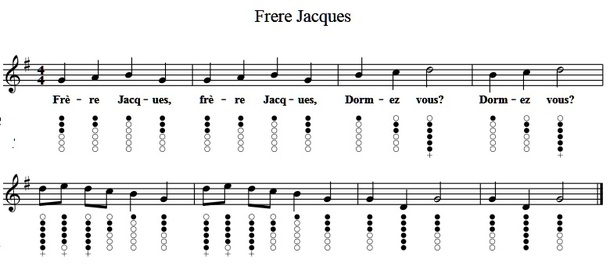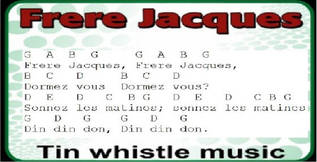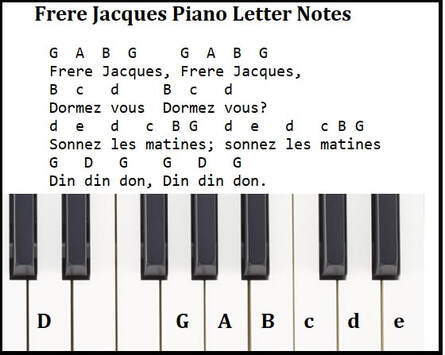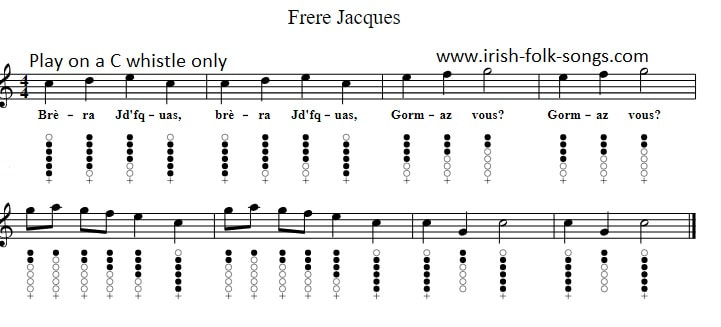Frere Jacques / Brother John Tin Whistle Sheet Music
Sheet Music with the tin whistle / piano / flute notes for beginners. The version of Frere Jacques I'm playing in the youtube video is the first one down on a D whistle. The second one goes a little bit too high. This is a popular children's song. Also suitable for The Recorder. I have also included a version in C Major which should be played on a C whistle. The Easy piano / melodica Letter notes are included
Introduction:
The Frere Jacques song is a timeless nursery rhyme that has been sung by children and adults alike for centuries. It is a simple melody with catchy lyrics that have transcended borders and languages, making it a cultural phenomenon. Despite its popularity, the origins and meaning of the song are often debated, adding to its mystique and allure. In this thesis, we will delve into the history, variations, and significance of the Frere Jacques song.
History:
The exact origins of the Frere Jacques song are unknown, but it is believed to have originated in France in the 18th century. It is often attributed to Jean-Philippe Rameau, a French composer, and music theorist, who wrote a song titled 'Frere Blaise' in the 1700s. However, this theory has been disputed, and the true composer of the song remains a mystery.
The earliest known publication of the Frere Jacques song was in the 1780s in a collection of children's songs titled 'Chansons nationales et populaires de France' (National and popular songs of France). This publication included four verses of the song, which were slightly different from the ones we know today.
Variations:
Over the years, the Frere Jacques song has undergone various changes and adaptations, both in lyrics and melody. In some versions, the lyrics are changed to fit the context or language, while in others, the melody is altered to suit cultural preferences. For instance, in English-speaking countries, the song is often sung as 'Are You Sleeping' or 'Brother John,' while in Spanish-speaking countries, it is known as 'Padre Francisco.'
Moreover, the Frere Jacques song has been used in different contexts, including religious services, educational settings, and even as a protest song. In the 1960s, during the civil rights movement in the United States, the song was adapted into a protest song with lyrics that addressed racial inequality and injustice. This shows the versatility and adaptability of the Frere Jacques song, making it a universal tune that can be used for various purposes.
Significance:
The Frere Jacques song has a significant cultural and historical significance, not only in France but also in the world. Its catchy tune and simple lyrics have made it a popular learning tool for children, helping them develop their language and musical skills. The song is also used in music therapy to help individuals with speech and language disorders.
Furthermore, the Frere Jacques song has been used in popular culture, making appearances in movies, TV shows, and advertisements. This has further cemented its place in our collective consciousness and contributed to its longevity.
Conclusion:
In conclusion, the Frere Jacques song is more than just a simple nursery rhyme. It has a rich history, various adaptations, and a significant cultural and social impact. Its enduring popularity is a testament to its timelessness and ability to transcend generations. Whether sung in its original French form or adapted into different languages and contexts, the Frere Jacques song will continue to be a beloved tune that brings people together and evokes feelings of nostalgia and joy.
The Frere Jacques song is a timeless nursery rhyme that has been sung by children and adults alike for centuries. It is a simple melody with catchy lyrics that have transcended borders and languages, making it a cultural phenomenon. Despite its popularity, the origins and meaning of the song are often debated, adding to its mystique and allure. In this thesis, we will delve into the history, variations, and significance of the Frere Jacques song.
History:
The exact origins of the Frere Jacques song are unknown, but it is believed to have originated in France in the 18th century. It is often attributed to Jean-Philippe Rameau, a French composer, and music theorist, who wrote a song titled 'Frere Blaise' in the 1700s. However, this theory has been disputed, and the true composer of the song remains a mystery.
The earliest known publication of the Frere Jacques song was in the 1780s in a collection of children's songs titled 'Chansons nationales et populaires de France' (National and popular songs of France). This publication included four verses of the song, which were slightly different from the ones we know today.
Variations:
Over the years, the Frere Jacques song has undergone various changes and adaptations, both in lyrics and melody. In some versions, the lyrics are changed to fit the context or language, while in others, the melody is altered to suit cultural preferences. For instance, in English-speaking countries, the song is often sung as 'Are You Sleeping' or 'Brother John,' while in Spanish-speaking countries, it is known as 'Padre Francisco.'
Moreover, the Frere Jacques song has been used in different contexts, including religious services, educational settings, and even as a protest song. In the 1960s, during the civil rights movement in the United States, the song was adapted into a protest song with lyrics that addressed racial inequality and injustice. This shows the versatility and adaptability of the Frere Jacques song, making it a universal tune that can be used for various purposes.
Significance:
The Frere Jacques song has a significant cultural and historical significance, not only in France but also in the world. Its catchy tune and simple lyrics have made it a popular learning tool for children, helping them develop their language and musical skills. The song is also used in music therapy to help individuals with speech and language disorders.
Furthermore, the Frere Jacques song has been used in popular culture, making appearances in movies, TV shows, and advertisements. This has further cemented its place in our collective consciousness and contributed to its longevity.
Conclusion:
In conclusion, the Frere Jacques song is more than just a simple nursery rhyme. It has a rich history, various adaptations, and a significant cultural and social impact. Its enduring popularity is a testament to its timelessness and ability to transcend generations. Whether sung in its original French form or adapted into different languages and contexts, the Frere Jacques song will continue to be a beloved tune that brings people together and evokes feelings of nostalgia and joy.
Frere Jacques beginner piano keyboard / melodica notes with letters
Below is the list of sheet music and tin whistle songs that are in my ebooks. This is the largest collection of tin whistle songs ever put together.[over 800 songs ] Including folk, pop and trad tunes plus German And French songs along with Christmas Carols.
All of the sheet music tabs have been made as easy to play as was possible.
The price of the ebooks is €7.50
All of the sheet music tabs have been made as easy to play as was possible.
The price of the ebooks is €7.50
Frère Jacques sheet music for tin whistle in the key of A Major. Play this on a D whistle.






